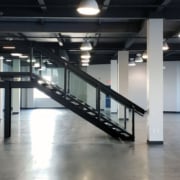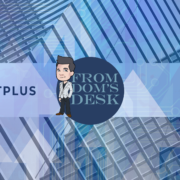Is Office Over?
Is Office Over? As an influx of employees around the world become accustomed to working from their homes due to isolation and social distancing, there arises a growing question: Is this the end of physical office spaces? While I for one will always jump in with an opinion or prediction based on the information I have at hand, these days it is hard to think what will happen next.
It seems like a reasonable conclusion at the onset, after all in the short-term, some companies across the country are reporting a net increase in productivity. Many employees love working from home — after all who wants to sit in traffic while commuting to work? They can also look after their children and forgo having to pay for daycare and last but certainly not least, working from home means the ability to focus on getting work done without interruptions. While true in many cases, there are some challenges to running a business in a completely remote environment.
When I entered the work force in the mid ‘90s, Flex-Office and working from home began trending, with the word on the street being that it was over for office. The internet was gaining popularity and connectivity, although cumbersome, was achievable. With the use of faxes too, working from home was possible and even efficient. Since then and pre-Covid, you would not have considered that office could be over. Skyscrapers still dominate the skyline and offices continue to be erected.
Now that Covid is upon us, the same question arises: Is it over for office? Well, companies have since learned that the benefits of working from home were outweighed by other key factors, namely:
- Retention – Keeping good people proved to be difficult.
- Leadership – Finding people within the ranks to promote within their company was also difficult.
- Training and Maintaining a Company Culture proved difficult especially with new employees.
All of the above have one thing in common — the lack of in-person interaction you do not experience even if you are connecting everyday online.
In a clip from the Fast Company Impact Council, Author and Motivational Speaker Simon Sinek poses that many leaders underestimate the effort that goes into running virtual workspaces. Sinek says that although productivity is seeing an increase with employees working from home, humans are social animals that need to be in the company of others in order to maximize creativity and teamwork potential.
“It’s very hard to brainstorm or have any creativity like this [over video call], we need to be in the company of others,” says Sinek in the video clip. “We need to be able to interrupt each other, write things on walls, and have that wonderful, magical energy, and then go for lunch together to build that relationship.”
There is an element that exists in the office that you simply cannot get from home. It is that energy when you see coworkers working together to achieve a common goal. It inspires you. It moves you. It is also the ability to take someone aside and have a brainstorming session over a steamy cappuccino. You cannot experience this from Zoom or other online video conferencing. On a personal note, I can tell when we are videoconferencing our board meetings, some members miss out on the intricacies and interactions that exist when the other members and myself are in the same room. It is hard to have a simple one-on-one conversation to ask about how their family is doing or ask about how their relative’s surgery went with a group video conference.
Being in sales and interacting with people on a daily basis, I cannot imagine getting the same level of a relationship you can build from a videoconference vs in person. Just the other day we had an in-person meeting with a consulting company that works on behalf of cell-phone carriers and building owners like us to install cell towers. During that meeting we learned more about how we can further that relationship vs if we were on the phone or videoconferencing. We enjoyed each other’s company and values and can see ourselves doing business together. That is the value of interacting in person.
What Will Change?
Though I do not foresee the end of the traditional office environment, I believe that with this new option for employees to be able to work from home, companies are going to utilize offices differently.
I do not see office continuing in the same matter as pre-Covid but rather the custom office space model taking off. Recently we have seen large companies like Facebook and Microsoft investing in newly-designed office spaces that allow workers to come and go as they choose. This opens up the possibility and flexibility for employees to come to work and utilize common work areas but at the same time work from home one or two days a week.
One of our properties, Britannia Business Centre (BBC) functions as one of these designated spaces, providing open workspaces for any sized company. It is designed to allow companies to meet with their employees when needed and utilize the space more efficiently. Some solutions we have are open-concept ‘bull-pen’ style offices, coworking space, shared offices, incubator spaces and virtual office. We even have a ‘Zen Space’ for those needing to get some fresh air to contemplate new ideas. This allows for employers to manage their cost and have a place to interact with their staff without the long-term leases and space commitments that exist with typical office space (although we also have this option as well).
This custom office model began to take traction back in the early 2010s — companies began providing co-working spaces and office rental services to individuals and enterprises alike. By renting an office space or a conference room on an ‘as-needed’ basis, they generate more profitability, especially for companies that lack the overhead of a corporate office. The community atmosphere this model allows for is the very reason I do not think this is the end of offices. Proven by the amount we all miss our friends and family during this pandemic, at the end of the day, human beings crave each other. The new office will provide balance of the social interactions we have learned is necessary within a company but also manage costs for the employer.
To learn more about custom office workspaces and how they are changing the office environment, visit Britannia Business Centre at www.calgaryofficeplus.com.
To find out more about the future of office real estate, contact InvestPlus REIT, where we always have our finger to the pulse of the changing Canadian real estate landscape.
About InvestPlus Real Estate Investment Trust
InvestPlus Real Estate Investment Trust (IP REIT) is a private real estate investment fund, based in Calgary, Alberta. InvestPlus REIT is a growth-oriented real estate investment trust focused on increasing unitholder value through the acquisition, ownership and management of commercial and residential properties in primary and secondary markets in western Canada. Management has transacted over $100,000,000 in buildings comprising of 22 buildings in the provinces of BC, Alberta and Saskatchewan. The current portfolio is appraised at $49,000,000 and comprised 10 buildings in 5 different cities in western Canada.
Read the top 5 reasons to invest in a REIT.
For additional information, you are welcome to reach out to InvestPlus REIT directly, however for offering documents and additional information it is best to reach out to Klint Rodgers, the Assoc. VP of Business Development and Registered Dealing in BC, AB and ON with Axcess Capital Advisors Inc., our lead Partner and Dealership as it relates to capital raise across the country. Klint can be reached at Klint.Rodgers@AxcessCapital.com or you can book a Zoom meeting with him through the following link: Book Meeting Now!












